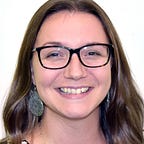A Reflection on Project Based Learning
I spent the last three years teaching in Fairfax County, Virginia, where we participated in an initiative to promote authentic learning through a project based model of instruction. The goal was for students to solve a big problem by making connections between five different projects. They would collect artifacts throughout the projects and compile them into one collection to be shared with the community at the end of the year. Our 5th grade team was one of the first groups of elementary students in the county to pilot the Project Based Learning initiative.
In order to kick things off, we needed to define the central question to be explored throughout the projects. We decided that students would examine why the blue crab population of the Chesapeake Bay was decreasing. In order to grasp the concept of interdependence, students created an original artifact that represented their sense of relationships within a community.
We then had to decide how the students would collect and display their work throughout the project. It became the grade-wide plan to curate an online portfolio through Google Sites. Students would use Sites to collect, display, and reflect on their new knowledge, in order to share it in a student-led showcase at the end of the unit.
Making It Possible
Once the theme was set, the students were immersed in resources and opportunities to conduct their research. In order to guide their work, we structured the following quarterly assignments, each centered around the theme of external impacts on water.
- The Big One — How does the movement of plate tectonics affect water levels?
- Music Makers — How does water affect the traveling and frequency of sound?
- Plastic Oceans Project — How does plastic affect the ecosystem of the ocean?
- Save The Bay! — Students created public service announcements declaring action to be taken
- Shark Tank — Invent or improve something that helps to solve an environmental issue
In addition to the classwork, we had the opportunity to visit the Chesapeake Bay Foundation in Annapolis, Maryland. Students interacted with experts from the preservation organization and studied the osprey population of the area. They were also able to collect samples of marine life from the bay and test the salinity of the water.
Looking Back to Look Ahead
After months of collecting data from different sources, the students collaborated in pairs to design their websites for the showcase. Students shared their work with teachers, environmental experts, parents, and community members. They reflected on these essential questions:
- Why are interdependence and interrelationships in science, societies, and other topics important?
- How am I a global citizen?
- How am I a creative and critical thinker?
The showcase was a big success. Students had their websites on display for the community, including pictures from their trip, reflections on their findings, and a statement that summarized the bigger picture. The months of research allowed them to speak confidently about the external causes that may be affecting the blue crab population. Making the transition from more traditional methods of assessment into a project-based mindset took some getting used to. The logistics had to be thought out carefully, but once we were organized and the students were up and running, the engagement was like none I had ever seen. Implementing PBL into the classroom empowered students to share their knowledge in various forms, allowing student creativity to shine in so many ways. Along with the big concepts of the unit, students took away the idea of how important it is to be able to explain and reflect on their thinking. A true portrait of success.
Written by Nick Spiegler, nspiegler@educatellc.com, @edtech_nick
Originally published at educatellc.com on October 29, 2018.
